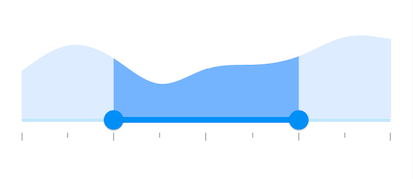How can I help you?
Ticks in Flutter Range Selector (SfRangeSelector)
21 May 202524 minutes to read
This section helps to learn about how to add major and minor ticks in the range selector.
Show major ticks
You can enable the major ticks on the track. It is a shape which is used to represent the major interval points of the track. The default value of showTicks property is false.
For example, if min is 0.0 and max is 10.0 and interval is 2.0, the range selector will render the major ticks at 0.0, 2.0, 4.0 and so on.
final DateTime _min = DateTime(2002, 01, 01, 09, 00, 00);
final DateTime _max = DateTime(2002, 01, 01, 17, 00, 00);
SfRangeValues _values = SfRangeValues(DateTime(2002, 01, 01, 11, 00, 00), DateTime(2002, 01, 01, 15, 00, 00));
final List<Data> chartData = <Data>[
Data(x: DateTime(2002, 01, 01, 09, 00, 00), y: 2.2),
Data(x: DateTime(2002, 01, 01, 10, 00, 00), y: 3.4),
Data(x: DateTime(2002, 01, 01, 11, 00, 00), y: 2.8),
Data(x: DateTime(2002, 01, 01, 12, 00, 00), y: 1.6),
Data(x: DateTime(2002, 01, 01, 13, 00, 00), y: 2.3),
Data(x: DateTime(2002, 01, 01, 14, 00, 00), y: 2.5),
Data(x: DateTime(2002, 01, 01, 15, 00, 00), y: 2.9),
Data(x: DateTime(2002, 01, 01, 16, 00, 00), y: 3.8),
Data(x: DateTime(2002, 01, 01, 17, 00, 00), y: 3.7),
];
@override
Widget build(BuildContext context) {
return MaterialApp(
home: Scaffold(
body: Center(
child: SfRangeSelector(
min: _min,
max: _max,
showLabels: true,
showTicks: true,
interval: 2,
dateFormat: DateFormat('h:mm'),
dateIntervalType: DateIntervalType.hours,
initialValues: _values,
child: Container(
height: 130,
child: SfCartesianChart(
margin: const EdgeInsets.all(0),
primaryXAxis: DateTimeAxis(
minimum: _min,
maximum: _max,
isVisible: false,),
primaryYAxis: NumericAxis(isVisible: false),
plotAreaBorderWidth: 0,
series: <SplineAreaSeries<Data, DateTime>>[
SplineAreaSeries<Data, DateTime>(
color: Color.fromARGB(255, 126, 184, 253),
dataSource: chartData,
xValueMapper: (Data sales, int index) => sales.x,
yValueMapper: (Data sales, int index) => sales.y)
],
),
),
),
)
)
);
}
class Data {
Data({required this.x, required this.y});
final DateTime x;
final double y;
}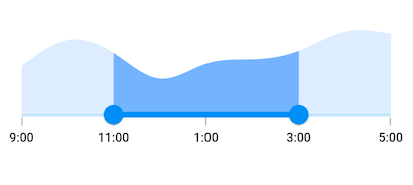
NOTE
Refer the
tickShapeandSfRangeSelectorThemeDatafor customizing the major tick’s visual appearance.
Show minor ticks
It represents the number of smaller ticks between two major ticks. For example, if min is 0.0 and max is 10.0 and interval is 2.0, the range selector will render the major ticks at 0.0, 2.0, 4.0 and so on. If minorTicksPerInterval is 1, then smaller ticks will be rendered on 1.0 and 3.0 and so on.
IMPORTANT
The default value of
minorTicksPerIntervalproperty isnulland it must be greater than 0.
final double _min = 2.0;
final double _max = 10.0;
SfRangeValues _values = SfRangeValues(4.0, 8.0);
final List<Data> chartData = <Data>[
Data(x:2.0, y: 2.2),
Data(x:3.0, y: 3.4),
Data(x:4.0, y: 2.8),
Data(x:5.0, y: 1.6),
Data(x:6.0, y: 2.3),
Data(x:7.0, y: 2.5),
Data(x:8.0, y: 2.9),
Data(x:9.0, y: 3.8),
Data(x:10.0, y: 3.7),
];
@override
Widget build(BuildContext context) {
return MaterialApp(
home: Scaffold(
body: Center(
child: SfRangeSelector(
min: _min,
max: _max,
interval: 2,
showLabels: true,
showTicks: true,
minorTicksPerInterval: 1,
initialValues: _values,
child: Container(
height: 130,
child: SfCartesianChart(
margin: const EdgeInsets.all(0),
primaryXAxis: NumericAxis(minimum: _min,
maximum: _max,
isVisible: false,),
primaryYAxis: NumericAxis(isVisible: false),
plotAreaBorderWidth: 0,
series: <SplineAreaSeries<Data, double>>[
SplineAreaSeries<Data, double>(
color: Color.fromARGB(255, 126, 184, 253),
dataSource: chartData,
xValueMapper: (Data sales, int index) => sales.x,
yValueMapper: (Data sales, int index) => sales.y)
],
),
),
),
)
)
);
}
class Data {
Data({required this.x, required this.y});
final double x;
final double y;
}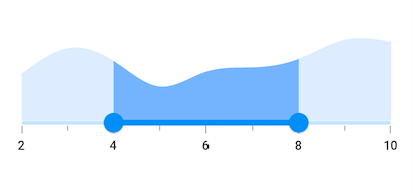
NOTE
- Refer the
showTicksto know about the rendering of major ticks at given interval.- Refer the
minorTickShapeandSfRangeSelectorThemeDatafor customizing the minor tick’s visual appearance.
Major ticks color
You can change the active and inactive major ticks color of the range selector using the activeTickColor and inactiveTickColor properties respectively.
The active side of the SfRangeSelector is between start and end thumbs.
The inactive side of the SfRangeSelector is between the min value and the left thumb, and the right thumb and the max value.
For RTL, the inactive side is between the max value and the left thumb, and the right thumb and the min value.
NOTE
You must import the
theme.dartlibrary from theCorepackage to useSfRangeSelectorTheme.
final double _min = 2.0;
final double _max = 10.0;
SfRangeValues _values = SfRangeValues(4.0, 8.0);
final List<Data> chartData = <Data>[
Data(x:2.0, y: 2.2),
Data(x:3.0, y: 3.4),
Data(x:4.0, y: 2.8),
Data(x:5.0, y: 1.6),
Data(x:6.0, y: 2.3),
Data(x:7.0, y: 2.5),
Data(x:8.0, y: 2.9),
Data(x:9.0, y: 3.8),
Data(x:10.0, y: 3.7),
];
@override
Widget build(BuildContext context) {
return MaterialApp(
home: Scaffold(
body: Center(
child: SfRangeSelectorTheme(
data: SfRangeSelectorThemeData(
activeTickColor: Colors.red,
inactiveTickColor: Colors.red[100],
),
child: SfRangeSelector(
min: _min,
max: _max,
interval: 1,
showTicks: true,
initialValues: _values,
child: Container(
height: 130,
child: SfCartesianChart(
margin: const EdgeInsets.all(0),
primaryXAxis: NumericAxis(minimum: _min,
maximum: _max,
isVisible: false),
primaryYAxis: NumericAxis(isVisible: false),
plotAreaBorderWidth: 0,
series: <SplineAreaSeries<Data, double>>[
SplineAreaSeries<Data, double>(
color: Color.fromARGB(255, 126, 184, 253),
dataSource: chartData,
xValueMapper: (Data sales, int index) => sales.x,
yValueMapper: (Data sales, int index) => sales.y)
],
),
),
),
),
)
)
);
}
class Data {
Data({required this.x, required this.y});
final double x;
final double y;
}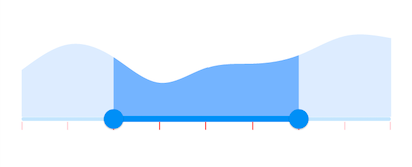
Minor ticks color
You can change the active and inactive minor ticks color of the range selector using the activeMinorTickColor and inactiveMinorTickColor properties respectively.
The active side of the SfRangeSelector is between start and end thumbs.
The inactive side of the SfRangeSelector is between the min value and the left thumb, and the right thumb and the max value.
For RTL, the inactive side is between the max value and the left thumb, and the right thumb and the min value.
NOTE
You must import the
theme.dartlibrary from theCorepackage to useSfRangeSelectorTheme.
final double _min = 2.0;
final double _max = 10.0;
SfRangeValues _values = SfRangeValues(4.0, 8.0);
final List<Data> chartData = <Data>[
Data(x:2.0, y: 2.2),
Data(x:3.0, y: 3.4),
Data(x:4.0, y: 2.8),
Data(x:5.0, y: 1.6),
Data(x:6.0, y: 2.3),
Data(x:7.0, y: 2.5),
Data(x:8.0, y: 2.9),
Data(x:9.0, y: 3.8),
Data(x:10.0, y: 3.7),
];
@override
Widget build(BuildContext context) {
return MaterialApp(
home: Scaffold(
body: Center(
child: SfRangeSelectorTheme(
data: SfRangeSelectorThemeData(
activeMinorTickColor: Colors.red,
inactiveMinorTickColor: Colors.red[200],
),
child: SfRangeSelector(
min: _min,
max: _max,
interval: 2,
minorTicksPerInterval: 1,
showTicks: true,
initialValues: _values,
child: Container(
height: 130,
child: SfCartesianChart(
margin: const EdgeInsets.all(0),
primaryXAxis: NumericAxis(minimum: _min,
maximum: _max,
isVisible: false),
primaryYAxis: NumericAxis(isVisible: false),
plotAreaBorderWidth: 0,
series: <SplineAreaSeries<Data, double>>[
SplineAreaSeries<Data, double>(
color: Color.fromARGB(255, 126, 184, 253),
dataSource: chartData,
xValueMapper: (Data sales, int index) => sales.x,
yValueMapper: (Data sales, int index) => sales.y)
],
),
),
),
),
)
)
);
}
class Data {
Data({required this.x, required this.y});
final double x;
final double y;
}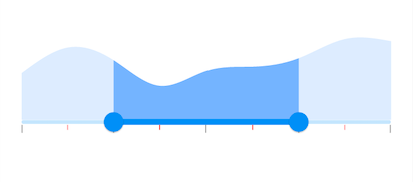
Ticks size
You can change the major and minor ticks size of the range selector using the tickSize and minorTickSize properties respectively. The default value of the tickSize property is Size(1.0, 8.0) and minorTickSize property is Size(1.0, 5.0).
NOTE
You must import the
theme.dartlibrary from theCorepackage to useSfRangeSelectorTheme.
final double _min = 2.0;
final double _max = 10.0;
SfRangeValues _values = SfRangeValues(4.0, 8.0);
final List<Data> chartData = <Data>[
Data(x:2.0, y: 2.2),
Data(x:3.0, y: 3.4),
Data(x:4.0, y: 2.8),
Data(x:5.0, y: 1.6),
Data(x:6.0, y: 2.3),
Data(x:7.0, y: 2.5),
Data(x:8.0, y: 2.9),
Data(x:9.0, y: 3.8),
Data(x:10.0, y: 3.7),
];
@override
Widget build(BuildContext context) {
return MaterialApp(
home: Scaffold(
body: Center(
child: SfRangeSelectorTheme(
data: SfRangeSelectorThemeData(
tickSize: Size(3.0, 12.0),
minorTickSize: Size(3.0, 8.0),
),
child: SfRangeSelector(
min: _min,
max: _max,
interval: 2,
minorTicksPerInterval: 1,
showTicks: true,
initialValues: _values,
child: Container(
height: 130,
child: SfCartesianChart(
margin: const EdgeInsets.all(0),
primaryXAxis: NumericAxis(minimum: _min,
maximum: _max,
isVisible: false),
primaryYAxis: NumericAxis(isVisible: false),
plotAreaBorderWidth: 0,
series: <SplineAreaSeries<Data, double>>[
SplineAreaSeries<Data, double>(
color: Color.fromARGB(255, 126, 184, 253),
dataSource: chartData,
xValueMapper: (Data sales, int index) => sales.x,
yValueMapper: (Data sales, int index) => sales.y)
],
),
),
),
),
)
)
);
}
class Data {
Data({required this.x, required this.y});
final double x;
final double y;
}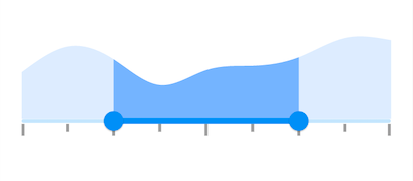
Ticks offset
You can adjust the space between track and ticks of the range selector using the tickOffset property in the SfRangeSelectorThemeData. The default value of the tickOffset property is null.
NOTE
You must import the
theme.dartlibrary from theCorepackage to useSfRangeSelectorTheme.
final double _min = 2.0;
final double _max = 10.0;
SfRangeValues _values = SfRangeValues(4.0, 8.0);
final List<Data> chartData = <Data>[
Data(x:2.0, y: 2.2),
Data(x:3.0, y: 3.4),
Data(x:4.0, y: 2.8),
Data(x:5.0, y: 1.6),
Data(x:6.0, y: 2.3),
Data(x:7.0, y: 2.5),
Data(x:8.0, y: 2.9),
Data(x:9.0, y: 3.8),
Data(x:10.0, y: 3.7),
];
@override
Widget build(BuildContext context) {
return MaterialApp(
home: Scaffold(
body: Center(
child: SfRangeSelectorTheme(
data: SfRangeSelectorThemeData(
tickOffset: Offset(0.0, 10.0),
),
child: SfRangeSelector(
min: _min,
max: _max,
interval: 2,
minorTicksPerInterval: 1,
showTicks: true,
initialValues: _values,
child: Container(
height: 130,
child: SfCartesianChart(
margin: const EdgeInsets.all(0),
primaryXAxis: NumericAxis(minimum: _min,
maximum: _max,
isVisible: false),
primaryYAxis: NumericAxis(isVisible: false),
plotAreaBorderWidth: 0,
series: <SplineAreaSeries<Data, double>>[
SplineAreaSeries<Data, double>(
color: Color.fromARGB(255, 126, 184, 253),
dataSource: chartData,
xValueMapper: (Data sales, int index) => sales.x,
yValueMapper: (Data sales, int index) => sales.y)
],
),
),
),
),
)
)
);
}
class Data {
Data({required this.x, required this.y});
final double x;
final double y;
}